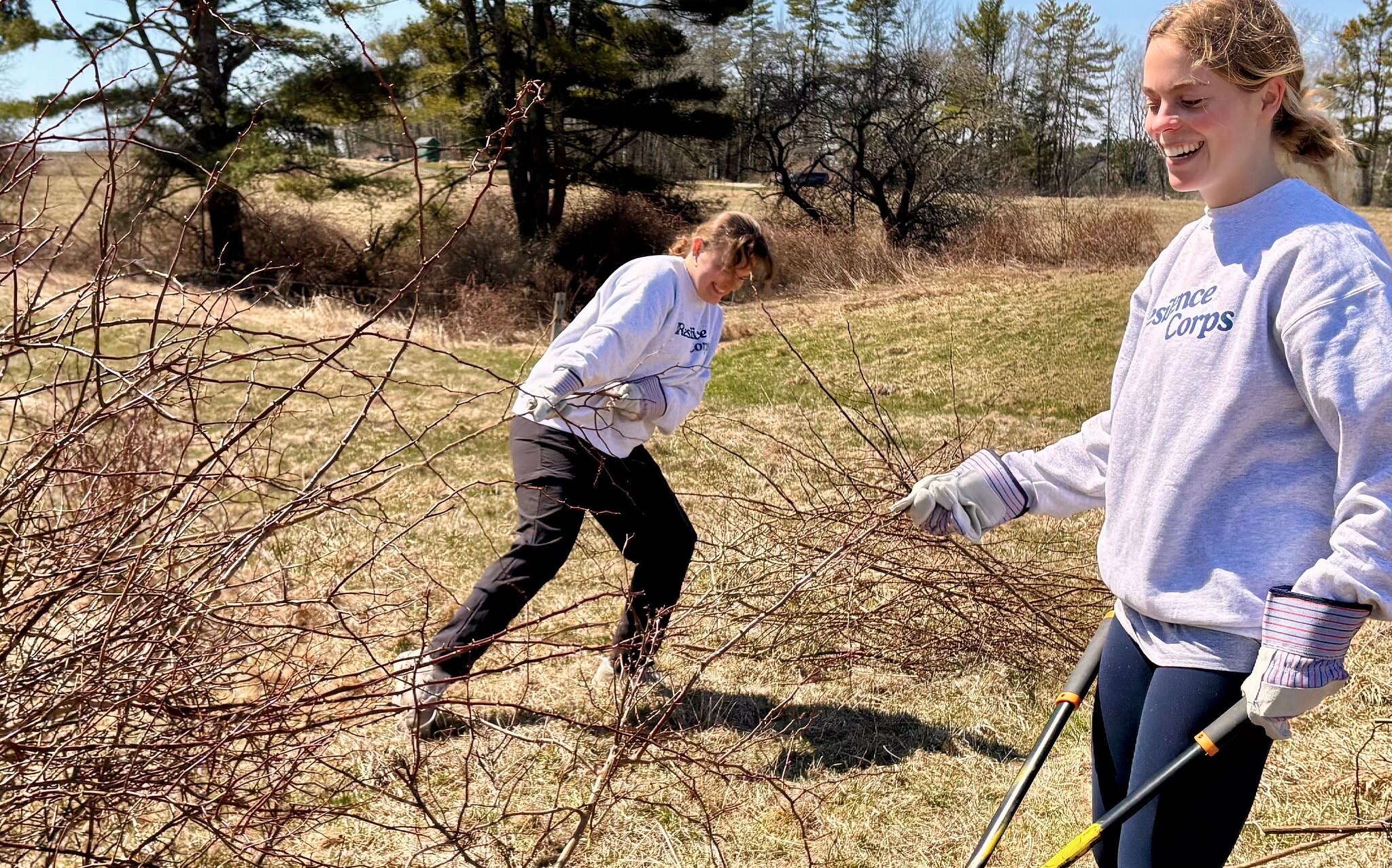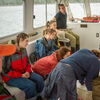
AmeriCorps cuts imperil Maine programs, nonprofits say
 Photo / Courtesy Julia Breul
AmeriCorps fellow Robyn Landes sorts produce as part of a day of service at the South Portland Food Cupboard.
Photo / Courtesy Julia Breul
AmeriCorps fellow Robyn Landes sorts produce as part of a day of service at the South Portland Food Cupboard.
Elimination of federal funds for AmeriCorps will imperil community service programs across Maine, according to Volunteer Maine and the Greater Portland Council of Governments.
“This is a devastating decision that undermines the very definition of efficient government,” said Kristina Egan, executive director of the latter organization.
“With minimal investment, AmeriCorps members deliver huge value to our communities — planning for community resilience, helping residents save money, ensuring clean drinking water, and engaging the public in important local initiatives," Egan added.
Volunteer Maine is a state service commission that awards AmeriCorps program grants using funds allocated to Maine, and provides training and technical assistance to potential applicants.
The Greater Portland Council of Governments uses its funds to pair 12 AmeriCorps Resilience Corps fellows with municipalities, nonprofits and regional planning organizations in Cumberland and York counties to provide education, outreach and training on activities such as data collection, analysis and visualization, mapping, research, communication and project management.
$4M terminated
Nationwide, AmeriCorps terminated close to $400 million in grant program funding.
In Maine, that put at risk some $4 million in AmeriCorps grants, according to a separate news release.
Eight AmeriCorps grants funded through Volunteer Maine, along with two additional direct grants, are listed for termination.
There are 46 AmeriCorps members serving in Maine. An additional 74 were slated to start their service over the next two weeks. The termination puts at risk the service of all 120 AmeriCorps members.

“These massive funding cuts mean that AmeriCorps members will be forced to exit their programs prematurely or not begin them at all,” said state Rep. Morgan Rielly, D-Westbrook. “Many members will be facing housing, food, health care and other financial emergencies as a result of losing their living stipends. Additionally, our communities will lose the crucial support they rely on from our AmeriCorps members, like help with sustaining local food systems, reducing poverty and supporting substance use prevention and recovery programs.”
Job loss
The 120 Maine members — many of whom committed to 1,700 hours of public service — will now only be able to complete approximately 30% of their year-long service.
At the Greater Portland Council of Governments, that means the elimination of federal funds for its 12 AmeriCorps positions.
The council said will be able to keep its fellows employed through June, but warned the agency doesn’t have funding to sustain the program beyond that.
The council receives about $300,000 in AmeriCorps funds annually and host communities and the council provide modest matching support.
Fellows earn a $28,000 annual stipend, receive health insurance and training, and qualify for a $7,400 education award upon completion.
The council’s fellows deliver an estimated $4 in community value for every federal dollar invested. Since 2020, 56 fellows have served through the program. Most are recent college graduates, and over 70% stay in Maine after their service year.
“These cuts pull the rug out from under young people trying to start careers in public service,” said Egan. “They also leave Maine towns without the staff capacity to move forward on urgent goals.”
Egan said the council is calling on Maine’s congressional delegation to help reverse the cut. Joining that effort was a group of Maine House and Senate members.
Conservation, water quality
Across Maine, AmeriCorps members help municipalities with resilience planning, conservation projects, chronic disease prevention programs and more.
In the town of Chebeague Island, AmeriCorps Fellow Ellie Hughes has been coordinating an energy transition project. So far, that’s included installing heat pumps in all municipal buildings and helping residents access energy-efficiency programs.
The municipal building portion will save the town over $53,000 of the $186,000 cost of the project, said Eliza Jane Adams, a member of Chebeague’s select board.
“The town of Chebeague Island does not have the staffing capacity to complete this project, and it is happening because of the work of our fellow,” said Adams.
Hughes is also planning an event for June when volunteer military veterans will remove brush along roads to lower the risk of wildfires on the island.
On Casco Bay's Long Island, AmeriCorps fellows in 2024 and 2025 have led the effort to conduct a study of the town’s only aquifer, which supplies water to all the island’s residents and is at risk of salt-water intrusion.
In Gray, a fellow has been helping the town produce watershed education materials and advancing local resilience initiatives through writing, design and research.
The 12 current fellows are serving in six municipalities (Chebeague Island, Gray, Long Island, Portland, South Portland and Yarmouth), three nonprofits (Gulf of Maine Research Institute, WindowDressers and Gateway Community Services) and three regional planning agencies (GPCOG, Southern Maine Planning and Development Commission and Midcoast Council of Governments). Their service supports initiatives across 24 Maine communities, from Kittery to Bath to Sebago.
According to the council, the Resilience Corps model aligns with the federal Department of Government Efficiency’s goals to deliver services cost-effectively, prevent more expensive future interventions and strengthen the local talent pipeline.













0 Comments